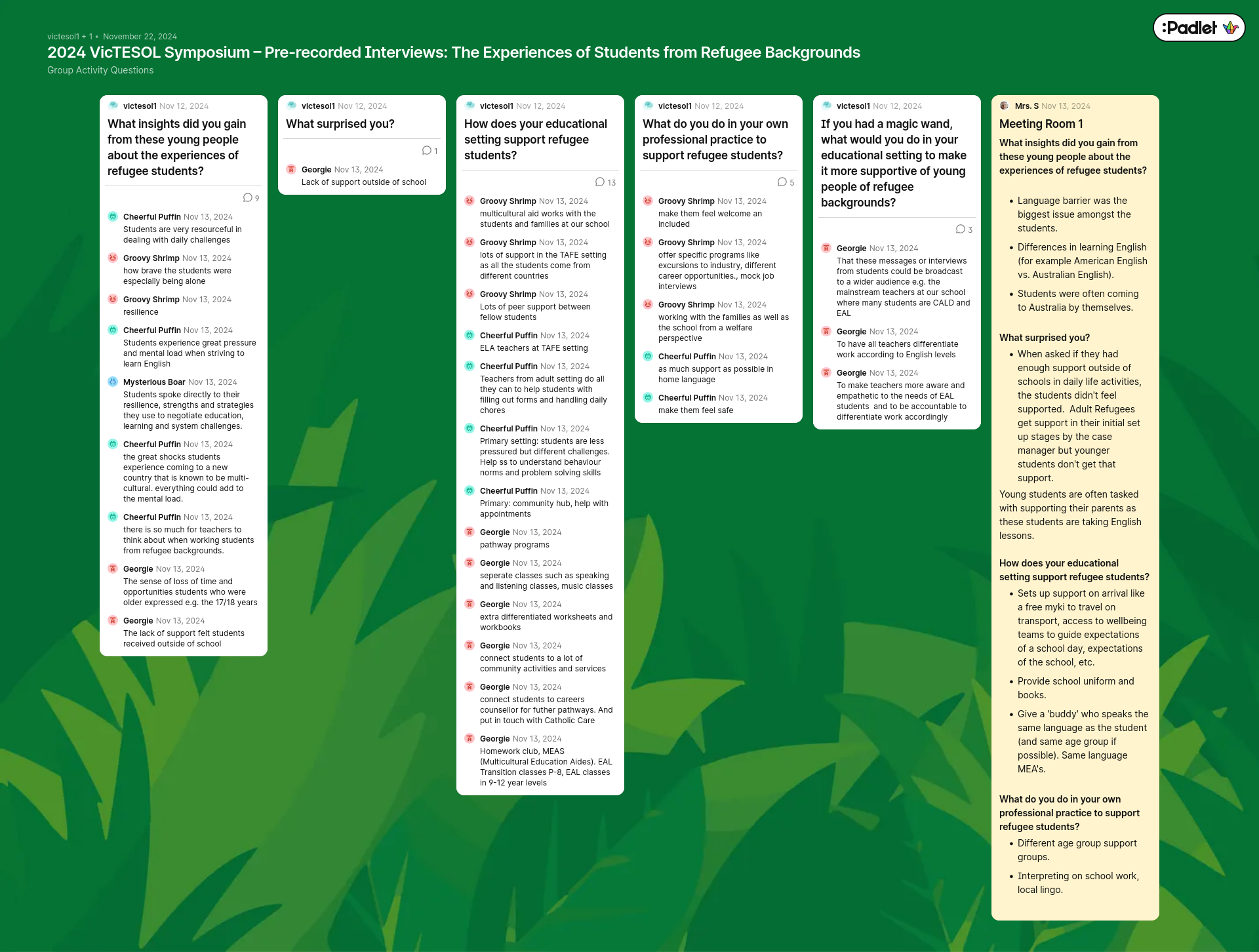Teaching EAL (English as an AI-assisted Language): From Exrater to ChatGPT
27 March 2025, 5:30pm – 6:30pm, AEDT, Online
Summary
Summary to come.
Recording
Resources
Resources to come.
Summary
Summary to come.
Recording
Resources
Resources to come.
Clustering Delivery and Assessment 6 March 2025, 5:30pm – 6:30pm, AEDT, Online Summary In this presentation, Frances La Riccia unpacked the process she and her Melbourne Polytechnic colleagues use to...
Meet the Assessors Online 2025 13 February 2025, 4:30pm – 6:00pm, AEDT, Online Summary The VCAA Chief Assessor for VCE EAL, Jenna Gomes, and Deputy Chief Assessors, Linda Hogan and...
Summary
Summary to come
Recording
Resources
Summary
In this session, final year PHD candidate Sherry, from the Queensland University of Technology unpacked her research into digital inclusion and equity for young people from refugee and asylum seekers in Australia. Her findings highlighted the complex challenges faced by students and educators in terms of access, resourcing and safe learning spaces. The session raised important issues for policy makers and the role of educators to provide culturally responsive and safe learning and facilitate resourcing for access to technology. It also provided insight into many of the challenges young people face during re-settlement and the critical role technology plays in both settlement and education.
Summary
VicTESOL were very pleased to have Dr Melanie Baak present the key note address for the 2024 symposium, which set the scene for the rest of the symposium events. Melanie presented on a significant body of research looking at how schools foster resilience for students from refugee backgrounds. She presented key learnings and information that resonated with the experiences of attendees. Melanie’s insights were very thought provoking, which generated lively discussions between attendees in break out room sessions and led nicely to the next programmed event – hearing the experiences of young people of refugee backgrounds in Victorian schools.
Recording
Resources
Summary
In this session, Lindsey Hogg, Professional Learning Officer, and Allison Greene, Lead and GROWTH Coach, from Foundation House Schools Support Program presented a session on Foundation House’s Recovery Model. This session unpacked practical and developmentally appropriate support strategies for learners’ impacted by trauma. The session emphasized the importance of trauma informed practice when working with learners from refugee or refugee like background and the importance of creating safe and culturally responsive learning environments that empower and promote the establishment of safe and nurturing relationships.
For More information of Foundation House Recovery Model or Refugee Education Support Program or wellbeing services for education sites contact: (03) 9389 8900
School support: https://foundationhouse.org.au/specialised-programs/schools/
Referral Support: https://foundationhouse.org.au/for-clients/make-a-referral/
Recording
Recording to come
Resources used in the session
Other Resources
Summary
This panel was held in response to symposium keynote address by Melanie Baak, Refugee education in Australia: what helps, what hinders and what needs to change. The Pannel was facilitated by Victesol committee member, April Edwards. Pannel members from a range of settings including school leadership and refugee support services discuss their experiences of working with students from a refugee background. This included the teaching of English as Additional Language, creating welcoming and inclusive social environments, supporting pathways and supporting wellbeing. The Pannel discussed ways schools can be culturally responsive and importance of supporting wellbeing and being aware of challenges faced within the settlement process and establishment of new lives and identities.
Panelists:
Sarah Cunningham has been employed with CatholicCare Victoria since 2020, coordinating a Job Readiness Program for refugee youth and their mothers in Geelong’s Northern Suburbs.
Debra Gibson is the Principal of Doveton College – a vibrant learning community comprising an Early Learning Centre for children 0-5 years of age, school for Foundation to Year 9 and a range of adult learning classes.
Christine Bakopanos is a Counsellor-Advocate Senior Practitioner at The Victorian Foundation for Survivors of Torture- known as Foundation House. Foundation House provides a range of services to people from refugee and asylum-seeker backgrounds who have survived torture or war related trauma.
Houda El Kheir has been working as a Multicultural Education Aide at Meadows Primary School, in Melbourne’s north for the last 5 years. She works closely with teachers, the principal and the wellbeing team in supporting newly arrived and refugee families to navigate the Australian schooling system.
Recording
Summary
Summary to come
Resources

Meeting information
2023 AGM Draft Minutes
2024 AGM Agenda
2024 Audited Financial Statements
Pre meeting information, documentation, and registration
We would like to invite you to join VicTESOL for our Annual General Meeting.
At the AGM we will listen to presentations from previous VicTESOL Research Grant recipients, hear about VicTESOL’s achievements from the last year, and formally award the 2024 VicTESOL Research Grant to the successful applicants.
Please note this meeting will take place online on Zoom.
Please RSVP by clicking below.
RSVPs close at 5pm, 22nd November 2024.
ACCEPT: Yes – I will attend the VicTESOL AGM
APOLOGY: No – I can’t attend the VicTESOL AGM
All forms are to be sent to victesol@victesol.vic.edu.au
Forms do not need to be printed and scanned but can be completed using word-processing software and by using an e-signature.
VicTESOL Committee Nomination Form
VicTESOL Proxy Form